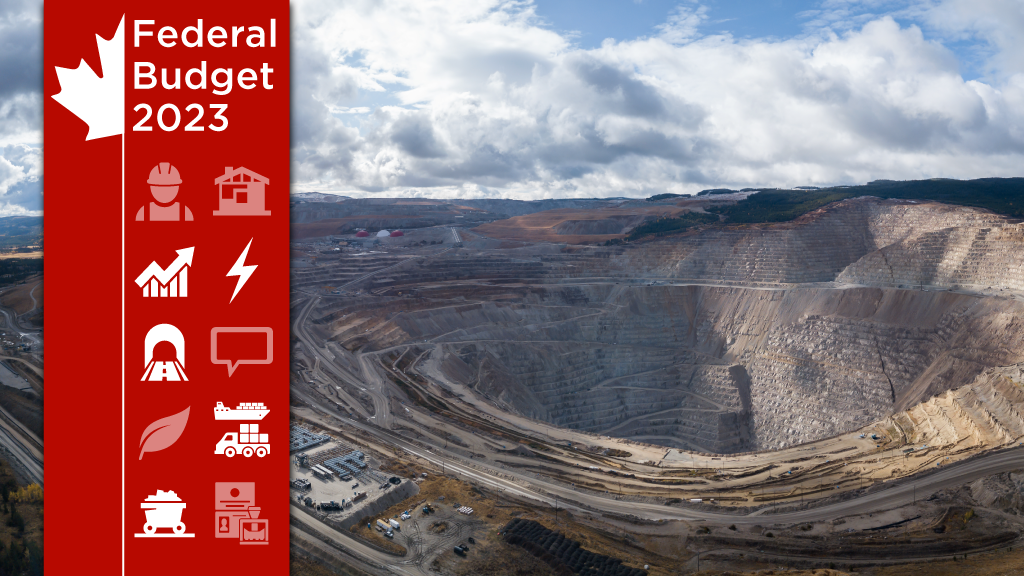The release of a new National Supply Chain Strategy is only months away according to the federal budget, which also touts tax credits for mining and carbon capture, and a move to quicken approval times for major resource projects.
Improving the supply chain
Budget 2023, unveiled March 28, contains several measures designed around supressing supply chain issues, which are seen as a “downpayment on Canada’s National Supply Chain Strategy, which will be released in the coming months,” the budget reads.
The downpayments include $52.2 million over five years to Transport Canada to establish a Transportation Supply Chain Office to centrally co-ordinate supply chain infrastructure and to establish work with Statistics Canada to create a transportation supply chain database.
Mitigating measures also include regulated new powers to the minister of transport to compel data sharing by shippers accessing federally regulated services, extending interswitching in the Prairie provinces and a review of the Shipping Conferences Exemption Act to improve competition.
Making the most of minerals
Budget 2023 introduces new tax credits for mineral mining expected to cost more than $4 billion over five years, and seeks to secure Canada as a primary resource for the manufacturing of electric vehicle batteries.
The Clean Technology Manufacturing Investment Credit is a refundable tax credit equal to 30 per cent of the costs for new machinery and equipment used to manufacture, process or extract the resources for key clean technologies.
These include the extraction, processing or recycling of materials like lithium, cobalt, nickel, graphite, copper and rare earth elements and the manufacturing of nuclear energy equipment, among others.
The budget also touts a previously announced investment from Volkswagen to build its first overseas gigafactory in St. Thomas, Ont., with costs considered in this budget. However, a detailed breakdown of the investment will be released in the coming months.
Further investments into creating a clean economy will rely on the Canada Growth Fund as a major attractor of outside investment.
Biofuels investments
Though electricity will be the main source of clean energy in the future, Budget 2023 also looks to investments in biofuels.
The budget introduces the Clean Hydrogen Investment Tax Credit which can provide between 15 and 40 per cent of eligible clean hydrogen project costs as well as a 15 per cent credit toward hydrogen conversion equipment.
The budget also commits to working with Canada’s biofuel industry leaders to “explore opportunities to promote its growth.”
Carbon capture credits
Budget 2022 introduced the Investment Tax Credit for Carbon Capture, Utilization and Storage and Budget 2023 offers some insight into what that credit will actually look like once implemented later this year.
The credit will include dual use heat and power equipment and water use equipment pro-rated in proportion to its use in carbon capture and expand the scope to include projects that store CO2 using geological storage in British Columbia, among other changes.
The legislative proposals are scheduled to be released for consultation in the next several months. Once the credit is legislated, it will be retroactively available for eligible expenses starting in 2022.
Forestry renewal
Budget 2023 provides $368.4 million over three years to Natural Resources Canada to renew forest sector support. This includes research and development, Indigenous international leadership and data creation.
Indigenous land development
Budget 2023 proposed to advance economic reconciliation by promoting Indigenous control of First Nations land resources.
Indigenous Services Canada will receive $30 million over five years to ensure First Nations can exercise responsibility over their lands and resources.
Crown-Indigenous Relations and Northern Affairs Canada and Natural Resources Canada will receive $35.3 million over three years to co-develop a First Nations-led National Land Registry to help communities realize the economic benefits of land control.
Major project delivery
The federal government is looking to address the lengthy approval times for major projects, pledging to outline a plan to improve efficiency of the impact assessment and permitting processes by the end of the year.
The Government also references a previous $1.3 billion commitment to the Impact Assessment Agency of Canada, the Canada Energy Regulator, the Canadian Nuclear Safety Commission and 10 other federal departments to improve efficiencies around major projects.











Recent Comments
comments for this post are closed